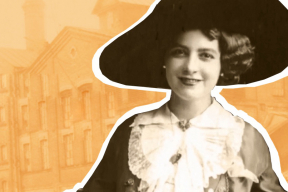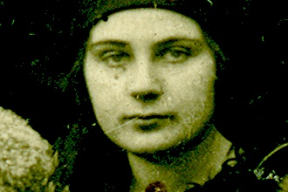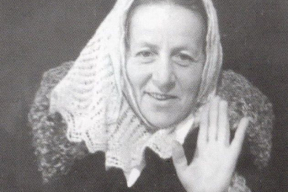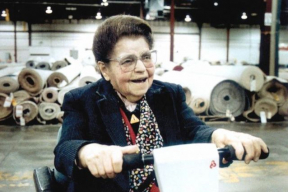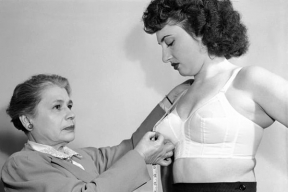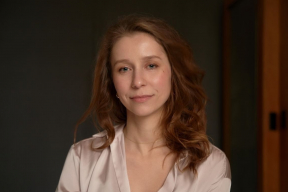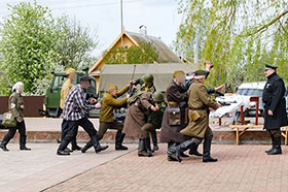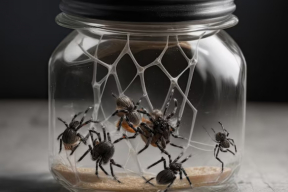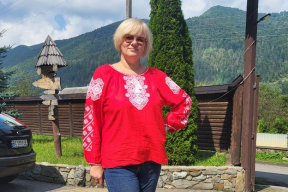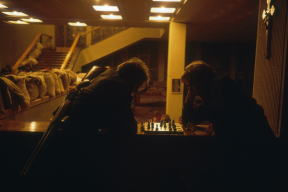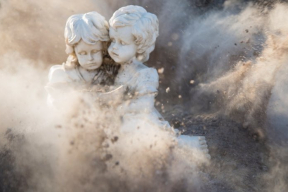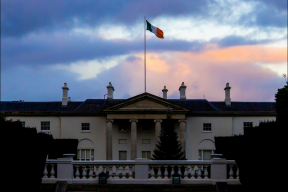Asya Bulybenko: «Cerberus» came to the cell. He said: «Anastasia has not reformed. Anastasia is a traitor to the motherland»
The former political prisoner told «Salidarnasts» how she survived the imprisonment and why the hell only began after her release.

Today Asya Bulybenko celebrates her 22nd birthday. This is her first «free» birthday after two years in captivity. She is celebrating this day in Vilnius. Asya has been detained four times in the last three years, the last one four months ago. After that she thought for a while that she had been broken, but she gradually comes to her senses and proves that it is not so.
«They splashed paint on my forehead and hand»
In the summer of 2020, Anastasia Bulybenko, a student of BNTU, was only 18 years old. The girl went to her first protest action in June, on the day of the detention of presidential candidate Viktar Babaryka.
On August 9, she put a white ribbon on her arm and went to her native Mahiliou to take part in her first presidential election. The very next day Asya returned to Minsk, where she witnessed the events on Pushkinskaya Street and, as she says, «came home a different person». Since then, she was going out every day on women's solidarity chains, Sunday marches, and joined the student protest movement.

The first time Asya was detained was at the «brilliant» women's march in September. Then, the girl recalls, they didn't even take away her cell phone in the detention center, and she was able to use the map to see where she was going. The police department drew up a report on the student, gave her a warning and let her go.
The next time the girl was detained in October at the student march. Then she was marked with red paint:
— This detention was very different from the first one. There weren't many of us, and when the law enforcers started running out of the buses, I managed to get away into the courtyards. I called my mom, told her I was coming home, and then a bus appeared out of nowhere and they shoved me into it, saying, «Go, bitch». The guys were face down on the floor, being walked on. There was constant cursing and cackling.

They started filming me with a flash, asked me how old I was, why I came out. They said I didn't know anything about life, and what could I possibly understand. I don't know what I did to anger them, but when they were dropping us out of the bus to hand us over to the police, they sprayed paint on my forehead and hand.
Before being transferred to Akrescina, Asya was allowed to wash off her red marker. The next day the girl was sentenced to ten days.
The day after my release, I went to my classes. I was summoned to the dean's office and was silently handed an order of expulsion for absence from classes while serving my time.

On November 12, 2020, the day that Belarusians nicknamed «Black Thursday», the fear of being in captivity again came true — the law enforcers broke into her apartment.
— That day I slept until lunchtime. The enforcers opened the door with their own key. The apartment was rented. As I suspect, they took the duplicate from the landlady under a non-disclosure agreement, — says the interviewee to «Salidarnasts». — I opened my eyes and there were six men above me. To this day, when I remember it, my insides clench.
They were out of uniform, but I realized what was happening. I tried to cover myself with a blanket and ask them to take my clothes. They thought I was hiding my phone or something and tried to pull the blanket off. When they pulled it down a bit, they realized what I wanted and handed me my clothes.
They immediately told me that I was a suspect under Article 342 of the Criminal Code — they would conduct a search and leave. At first the visitors behaved harshly and rudely, but at some point they began to soften.
Later, one of the KGB men talked to someone on the phone and said that we would go somewhere to talk and then they would bring me home. I asked what to take with me. One «just in case» advised to bring a toothbrush, another — two packs of cigarettes instead of one.
A week in the KGB pre-trial detention center
— When I was brought to the KGB pre-trial detention center, I was placed in the «red» room. It was an empty room with a red carpet. I sat on the floor and thought: well, I guess these are the cells here. Then they took me for interrogation.
The first person to speak to me was the «plain clothes policeman» from the university. He knew what kind of cigarettes I smoked, he showed me my childhood photos. He told me that I should write a confession, after which I could go home. I didn't really want to write this admission of guilt, then they decided to play bad cop-good cop. The «plain clothes policeman» who was talking to me normally walked out.
Another one came in and he started yelling, using rude words, telling me that I had decided to «hype». I didn't get the feeling that a confession was what the name implies. He said to write like an explanatory statement, gave an example. At the end of the confession I wrote that I didn't admit guilt, which is illogical. If you re-read it now, it will become clear: I did not understand what I was writing at all. It was kind of free-form, but also practically dictated.
Legally, it turned out that I came to the KGB myself. That's why the protocol of detention was written in the same time and place, as if I had been detained in the KGB, not at home.
«Girls, they are taking us to Volodarka — it's death». Nine months in the Volodarka pre-trial detention center
— On the day of being transferred to the pre-trial detention center on Volodarskogo it was very scary. The committeeman who conducted interrogations tried to make me feel at ease by feeding me dried apples. At the same time he was informing about our further journey in his sweet way.
From his stories I got the impression that Volodarka was a prison from Russian movies. When he said that we would be sent there, I went back to my cell and started crying: «Girls, everyone, they are taking us to Volodarka. This is death».
Upon arrival there, the contrast was very much felt. In the KGB pre-trial detention center there was discipline - the staff spoke in whistles, all in movie style. No one called your last name - the trough was opened and they said: «Last name with the letter B., come here». At Volodarka, all the employees stood on the aisle and smoked, drank coffee, and swore terribly.
I remember very well how I entered the cell. It was smoky, there were a lot of things, holy pictures standing there. When the door closed, other political prisoners began to ask what was going on in freedom. Someone then told them not to yell. Anyway, it was chaos.
I climbed up to the second tier, there was a girl under three two eight (Article 328 of the Criminal Code - S.), she had a huge book in her hands, which she had almost finished reading. I asked her how long she had been sitting here. After her answer «seven months», my world collapsed: I didn't know that one sits so long in the pre-trial detention center. Masha Bobovich (a political prisoner at the time — S.) showed me a huge bag with letters written to her by strangers. I was like, «What do you mean, strangers write to you? Children drawing postcards? Wow!».
— Quite quickly I got involved in reading - in just two years I read about 200 books, — Asya continues. — Then letters started coming, including from strangers, and I started drawing small pictures. A day when I received at least one letter was a good day.
When the letters stopped coming, Natalie Hershe and I went on hunger strike. Just a couple of hours later, they took away the television set from the cell. I was summoned for a talk, persuaded to give up the hunger strike and promised to return the letters, but was transferred to another cell.
On the same day I started receiving letters. In the new cell there was a «senior» who was obeyed by everyone - it was a woman who had been in jail for a long time for freezing her child. Among the political prisoners in this cell was Stasya Mirontseva — we became friends and communicated well.
In general, the most difficult thing in the pre-trial detention center, I think, was to realize who surrounds you. There were real drug addicts who were pounding and didn't want to take therapy, murderers, swindlers who begged to buy them food at the «otovarka». I had to shut myself in, not tell what was going on in the interrogations, even though I wanted to share it.
There was a time when the window in the cell was boarded up. Just like that. We assumed it was because we were feeding sausage to the dogs on the street. It was very scary, because the humidity in the cell became terrible: Vika Kulsha (political prisoner — S.) got a cough that did not go away for a long time. The mattresses were wet, and there was mold on them, as well as in the cell in general.
When we wrote a letter to clean the cell from mold or open a window to provide ventilation, we were sort of «helped»: they gave us chlorine and chemicals, closed the cell and told us to do it ourselves. We thought we were going to suffocate, but we managed somehow. We gave the mattresses in for drying, but it didn't solve the problem — they didn't open the window.
— In the winter of 2021, you often wrote in your letters about the hope of spring. Spring came, you didn't get out. How did you feel?
— At first we believed we'd come out on New Year's Day. We dreamed we'd surprise our relatives. Then we thought we'd come out in the spring - maybe by March 8 or Day of Freedom. Then April became our «month of liberation» — a new package of sanctions was announced on it.
Already at the trial (the trial on the «case of students» began on May 14, 2021 — S.) there was no hope, I was already counting on the term. In the cell, the girls were making a list of things for the transferring, the colony. I tried to peek, and they said: «You don't need it, child. They'll let you go home». Back then, many people were still given «home chemistry» — probation. But I didn't believe in it anymore.
«Naked» searches, two slices of bread a day. Two months of court hearings (May 2021)
— After eight months, at least some movement began: relatives and friends came to the trials. I finally saw my mom! It was a kind of silent date.
Physically, the trials were exhausting. We were picked up from our cells at 6:30 a. M., searched, and taken to court. In between sessions we would sit in the glass. We would return to the cell in the evening, and in the morning we would go round and round again.
During the time I spent in the pre-trial detention center, I saw many times how people gather for the trial: they take food, crossword puzzles, books. But it wasn't like that with us.
First of all, the search. For ordinary prisoners, it looked like feeling with fingers and checking with a metal detector. We had daily «naked» searches, where we had to argue even for personal hygiene items. If someone had their period, you had to tear off the pad and show what was underneath. It was an act of humiliation.
Secondly, during the first days of the trial even food was taken away from us, they said it was not allowed. I'm not talking about sudoku and crossword puzzles. Instead of our lunch, they gave us two pieces of bread and a piece of meat for the whole day.
Before the trial we had to eat a piece of bread, during the break-meat, in the evening — the second piece of bread. It was not enough at all. Then our parents wrote an application and we were allowed to take food and water.
We were also handcuffed while being transferred to and from the trial. According to our article this was not allowed, and women in general can only be handcuffed from the front. We were handcuffed from behind.
Three months in Gomel pre-trial detention center (August-October 2021)
— Gomel pre-trial detention center is very strict. They immediately took away my felt-tip pens, all my «white-red-white rings» — from ketchup and condensed milk packaging, all the newspapers «Novy chas», «Belarusians and the market».
They put me in a cell for juveniles, in the building with the name «Monastery». There was an open window in the cell, though with a grate. Through it I could see the courtyard, the star of the Gomel factory «Eighth of March». I often looked at it and drew.
The really awful thing there was the toilet. At Valadarka a curtain was allowed in the toilet, somewhere there was even a door. In Homel there was nothing — a toilet and a wall. There was also video surveillance in the cell. That is, you could be seen, heard, and filmed.
In addition, there were thin mattresses in the cell, which gave bruises to skinny people. The strict regime also manifested itself in the fact that some shifts did not allow feet on the bed. You could only sit so that your feet were on the floor. So you could not even think about sleeping. If they saw you napping sitting down, they would not turn a blind eye to it.
There were medical problems there, too. When I fell ill with conjunctivitis, they told me that there were no drops, you could treat yourself with a tea bag. The swelling went down, but I suffered with my eyes even after I was released. I also had a toothache there — I went to the dentist, the doctor asked everything about our case, began to treat the tooth (of course, without anesthesia) and put a temporary filling.
A year in Homel penal colony No. 4
— In the first weeks in the colony there was some kind of euphoria. I looked at the sky, it seemed huge. I remember when we walked with the girls on the territory, I cried, one of us was able to run - the territory was big, you could see stars, blooming roses, kittens. In life I pay attention to all these things too, that is, in the colony my emotions just came back.
In the colony there was a clear division between political and non-political. If you have a yellow tag, you live differently. And I'm sure all the political ones will tell you differently, because they all had their own approach.

In quarantine, my former chief of case officers, Cherny, came to see me. He asked me if I wanted to go home. I said yes, and that I would do anything to get there. By this phrase I meant participation in making wall newspapers, dances and other activism. I thought that then I would probably be released on parole — at that time we did not know that parole and extremists (Asya and the others convicted in the «students' case» were registered as prone to extremism — S.) are incompatible things.
Later it turned out that this person meant admitting guilt and writing a petition for pardon. When I turned out to be one of those who steadfast refused to admit guilt, he said: «Anastasia, you said you were ready for anything», to which I replied: «I'm sorry, but we didn't talk about that, I'm not ready for that».
After quarantine, I was transferred to the detachment, where I became friends with Vita Bondarenko, also a political prisoner. Because of this communication I was transferred to another detachment. This is how I learned that not all «yellows» are allowed to communicate with each other.
The interviewee of «Salidarnasts» recalls with horror the case officers of the detachments with whom she had to contact. She calls them «torturers» of prisoners.
— This is a person who knows everything that happens in the squad, whose people turn you in. He knows not about who steals, but who gave candy to whom and will go to the SHIZO [penalty centre] for that (in the colony prisoners are not allowed to share food among themselves — S.).
Both operatives with whom I had contact were young. They liked to threaten relatives. Alexei Olegovich Zyuzin could come up to me at the factory and say: «Well, BulybEnko, can you reach your mother?». (Asya's surname has stress on the second syllable, not the third — S.). And I have a call in a week, and all this time I was thinking: whether my mom was detained, whether she is alive and what this phrase meant.
Goncharov Yaroslav, for example, did the following. There was a woman in our detachment: yes, she stole, but she is a person who has no help, no care packages. She took a piece of bread from the canteen to the detachment, which is forbidden. During the search this bread was found, according to the rules of the colony, they should have written a report about her, issued a warning to her or sent her to the SHIZO.
But Goncharov took the whole detachment outside, put this woman in the center, brought her a loaf of bread and told her to eat it. He sat down on a bench, leg by leg, and watched ninety women watching one of them eat bread dry.
«You juvenile, you hate your family. Write a confession».
— Because you refused to admit guilt and write a petition for pardon, you were pressured. Tell me about it.
— The pressure to confess guilt began in November (2021 - S.). A month after my transfer to the colony, I was forbidden to go to the «club» — there you could watch movies and listen to lectures. Later, Zyuzin banned me from reading, blackmailed me with calls and visits to my family. Because of the non-recognition of guilt, I was not given the first long visit, scheduled for January 6.
Twenty minutes before New Year's Eve, he came to the detachment and asked: «BulybEnko (he called my surname with a wrong accent as a matter of principle), what present do you want for the New Year?». I answered that a long date. He said: «You know my price». And walked away. My mom found out that there would be no date two days before, when she already had her bags packed. I didn't get my first long one until three months later.
On New Year's Eve itself, I was not allowed to go to a concert. The head of the detachment Kravchenko Victoria asked: «Do you have your guilt signed? No? Then you won't go».
Also in the colony there is such a method of pressure, when operatives communicate with women, locking themselves one-on-one in a wardroom or an empty section. It was the same when the UDIN [penal enforcement department] inspection came — one by one they called the politicians. When I entered, there was Sivtsov, the head of the «regimen», and a representative of the UDIN.
They asked me who I was and why I was here. If in the pre-trial detention center you could make a joke and answer "for songs and dances", in the colony you could not. I answered that I was sentenced for organizing student actions and named the article. I was asked what I was actually sentenced for, not according to the article, to which I replied: «And actually, for nothing».
Sivtsov asked me how long I had been in jail, how much time I had left, and whether it was «worth it». I said: «Yes, it was». Then I was asked what I planned to do for the rest of the year. «I plan to draw wall newspapers, dance — I'm not sorry, someone has to do it at your place», I replied.
Sivtsov responded, «You know, one can extend the year». Such a threat made me feel uncomfortable, and the UDIN representative asked Sivtsov to bring me back later.
That same day, I was called again for a conversation. They asked about me, about what I liked to do when I was free. Then a detective from another squad came to me: he closed us in the section, opened my nightstand, took out my drawings, started shaking them and yelled: «You, little girl, hate your family. You don't understand anything. Write a guilty plea. You're not getting out of here».

For me to admit guilt and write a petition for clemency was a terrible internal struggle. I realized I couldn't write it, I wouldn't forgive myself. At the same time, I do not condemn those who did it. I was sure that everyone who had written a petition would be released. I warned my mother: be prepared that everyone would go out and I would stay.

During the year that Asya Bulybenko spent in the colony, she was transferred several times from unit to unit and changed her working specialty at the factory. The political prisoner worked on a technical iron made by Politech (which was, as she recalls, a «control shot»), which caused her psoriasis to worsen. Then — on a sewing machine and an overlock.
— Mostly we sewed uniforms for the police. We were also amazed at why so many. The quantity was unreal. Of course, safety is violated at the factory. During the whole shift there is only one 10-minute break. It's very dusty, the girls pierced their fingers with a needle, cut themselves — all this because of the frantic pace.

In general, ordinary prisoners were often turned against political prisoners. We could be called «rogue». For example, ordinary prisoners did not like to go to the club, and we were forbidden to do so. At some point, we were forbidden to go to the industrial zone, where we had to clear puddles and snow.
I, unfortunately, experienced that. And it's a terrible memory: to see women soaking puddles with rags. It's inhuman. Or snow removal — it's a huge area where you have to remove the snow and take it behind the dining hall building. I remember that in frosty weather my hands would freeze and start to burn.
Fighting to get the travel ban lifted and living an unfree life
— I was released on November 30, 2022, and I got registered on December 1. I was told that I was allowed to travel and could go abroad to study and get treatment, but already on December 3 I had a travel ban, dated the first day of December.
The reason for the travel ban on the former political prisoner was given as «conviction for a crime.». Legally, this meant as if Bulybenko was still in the colony:
— Of course, I was outraged by this. I wanted to leave, because I didn't quite understand how to stay. Life in Minsk is not freedom. In public places colony staff were haunting me, I saw girls who stayed in prison.
When the euphoria of release passed, and the ban was still not lifted, I realized that I was not ready to «go through the forest», because I did not want to go back to the colony. Then I started to think how to lift the ban.
First I talked to inspector Bolshunova at the police department. I explained that I was sick, I was in the hospital because of psoriasis, and I needed to leave to get treatment and study. She said that I was not going anywhere and that «people like me had stolen two years of her life» because she had children walking under guard.
She said: «You're not some drunk who accidentally cuts someone up. You know what I mean, right?».
That's when I realized what kind of Orwellian world I was in. I wrote a petition to lift the travel ban, it was rejected, and the complaint was rejected too. Then my lawyer and I decided to sue. The court hearings began.
When the judge asked me on what basis I was banned from leaving the country, the inspector replied: «An order from above» and named some instance. At the third hearing, the inspector said that the ban had been lifted. I signed the notification and saw with my own eyes that the ban was lifted. But at that moment I had a bad feeling.
I wrote a withdrawal of complaint against the police department, because my demands were satisfied. But the anxiety was still growing. It began to seem like a trap - the paper had been forged or a new ban was about to be issued.
I left the courtroom, hugged my lawyer, went to a nearby shopping center to buy a toy for my brother. As I left the mall, a man approached me and showed me his ID. That's when the ground went out from under my feet.
They said they were detaining me for smoking in a public place near the courthouse. I agreed - I was smoking, but everyone smokes there. I thought they'd used that loophole. I went into the car, where there were five men in civilian clothes.
«Why again?». The first 15 days on Akrestsina (April-May 2023)
— In the car, the officers behaved disgustingly - they tried to take my things, joked around, didn't answer where we were going. At one point I thought I was so «lucky» to be in a car with maniacs this time.
I realized that the Frunzenski police department was very close, but we were going in some circles. I don't know what kind of route it was. Probably to scare me. Then one of them admitted that we were going to the police department, to which the others said, «What did you say to her?».
When we arrived at the police department, I realized that it was their work, that it was all for the complaint — I was handed over to other people, and they took me to the Oktyabrsky police department. They spent a very long time finding out why I was there.
I heard them discussing among themselves why they brought me there and who I was. The officer who processed me asked: «What are you, a white-red-white fighter?». And here, unlike in my two-year sentence, where I held back my tears to the last, I burst into tears.
I screamed: «I did two years in 342. Why again, why so cruel? I'm out, I don't read the news, I don't like anything». He looked at me with such eyes, I guess he really didn't understand why I was here. He asked for my phone password, but I wouldn't give it and demanded a lawyer, which in the end they didn't give. I was allowed to call my mom - she, already learned by experience, reacted quickly — brought me a change of clothes and cookies.
I was given to sign a protocol, as if I was shouting and waving my hands around the Oktyabrsky police department. Then I realized that they can do whatever they want. They literally kidnap you on the street and write that you did something, while remaining unpunished.
Everything turned out to be a trigger. Search, I get hysterical. They take me to the holding cell, second wave of hysteria. I've never been in a place like this before — pissed corners, stinks. It's just concrete walls that I spent the whole night alone in. It was scary. I realized I wasn't going to lie there and tried to stay awake until the last minute.
I smelled the cookies and chewed on them slowly. I think that's when I went crazy... I was walking and mooing Nadia's song «Zorami» (a song by the band Irdorath. Nadezhda Kalach, the lead singer of the band, together with Asya was serving her «punishment» in the colony — S.), which had not been released yet. I tried to convince myself that I would come out tomorrow. Because other thoughts were tearing me apart. But I was not released and was sentenced to 15 days.
I was torn to pieces. I realized what Belarus is like now. The evil joke was played by the fact that I really didn't read the news... For the first three days on Akrestsina I was sitting in a hood and wasn't eating. I thought I was going to go crazy. This didn't happen during my first days of arrest, I had only read about this kind of thing in August 2020.
When I went into the cell, which was a double cell, there were eight people in there. At most there were 18 of us. It was hell. The food was disgusting, I didn't eat until the third day. Those days in prison were the worst thing that ever happened to me. Something that undermined my psyche.
Everyone in the cell was «political». Only now there were people there for reposting. For example, a girl got days of jail for reposting «Zerkalo» about the northern lights. I listened to these stories and every minute it got scarier.
We tried to count the steps — the camera was about seven meters, and there were an average of 10-12 of us sitting there. There was nothing. I was in the same underwear through all the days there. They put homeless people in the cell — they were marginalized people who stank, it was impossible to wash them in Akrestina, where there was one piece of soap for everyone and one sink. Everyone picked up lice, and it was almost impossible to get rid of them.
The day before I was released, someone came to see me and called me to the fourth floor, which is the administration floor, where they rarely call anyone. The man did not introduce himself, but by his manner of speech I assumed that he was a KGB man. I nicknamed him «Cerberus», because that's what it said on his key chain.
He spoke of me in the third person: ominous and movie-like. «Anastasia is not reformed. Anastasia is a traitor to her homeland. Anastasia has not learned from her mistake. Anastasia will need to think about her behavior».
At one point he asked me to sing him a hymn. I remained silent. He said: «If you don't know at least one line from the hymn — you won't come out».
I began not to sing, but to tell the hymn. I mixed up everything because of nervousness — I started either from the second verse or from the chorus. He said: «It's clear, Anastasia doesn't know the hymn. Anastasia, name the day of the flag, coat of arms and anthem». I didn't know about such a holiday at all and didn't name it. He said I should sit and think about it some more.
I realized that he knew about the «students' case», I got the impression that he might have been involved in it. He was so angry with me. I was returned to my cell, and I told my cellmates that I would not go out tomorrow. I was shaking.
Before that, through a woman who was being released, I managed to send a word to my mother. I ordered kebab, coffee and marshmallows for my release. But instead of being released, they took me to the court again. It was strange: they didn't handcuff me, I went in through the main entrance like normal people. As I looked around, I had a thought: how can I escape? You're standing there, there are people walking around and they don't even know you're «done» — and it was also splintering.
I walked into the courthouse, where I managed to dictate my mom's phone number to one of the women to let her know I wouldn't be released today. My mom first sent an acquaintance to the court — with kebabs and coffee - and then came herself. I was dirty, smelly, and lousy. While we were waiting for the court, we could sit in the corridor together, chatting. Mom put a second pair of panties on me.
I called Yegor (Asya's young man — S.), but it was a conversation about everything and nothing. I only said that I didn't understand why they were so cruel. Later they called me and added another 15 days.
«Cerberus came back». The next 15 days on Akrestsina
— I went back to the cell, said I was added days, but I had drunk coffee, eaten a kebab and seen my mom. Someone was crying, but I couldn't anymore. The girls say I spent the whole night just staring at one point on the ceiling.
For the next 15 days I was mostly silent, I didn't play mafia, but I started eating more, although I still came out a «skeleton». All this time I waited for «Cerberus» because he said he'd be back.
The day before she was released, Cerberus came back. He spoke differently, said that we had «got off on the wrong foot». By the time he arrived, I had learned the anthem with my cellmates, asked who knew what public holidays and memorized them. He asked what I had learned — I told him all this. Then he asked who the Prime Minister was in Belarus. I didn't know, and I got scared, so I decided to go another way and asked him to tell me. He told me, showed me some stands.
Then he said that he would think about whether to lift the travel ban - as if they had put it on me again. He said that I couldn't leave and that I should «say hello to my boyfriend» (Yegor Kanetsky, a defendant in the «students' case» — S.).
I asked him if Egor could come to me, he said no. He said that if I left, they would find me everywhere, because "there are people everywhere. At the same time, if I did something, they would not pity me and I would go to jail for a very long time, but now they were giving me a chance.
The next day I went out — my suitcase was already there. Next — the tickets, the train station. I went out into another world again - when I sat down, everything was gray, when I got out - everything was green.
It was very scary to leave, I didn't want to go. I was so frightened by the words of «Cerberus» that I seriously thought of returning to Mogilev, enrolling into Kuleshov University and living a quiet life. But still I decided to take a last risk. On the road I tried to prepare for detention at the border, but it didn't happen. However, the nightmare did not end there.
«Cerberus» became my new chaser. In jail I dreamed how I was singing a hymn to him, already here in Vilnius, how he was cutting my face.
— In June, shortly after you were released from Akrestsina and moved to Vilnius, you said that they managed to break you. Do you feel the same way now?
— The first night in Vilnius, I couldn't sleep lying down. I felt like I was in a cell. I thought I was broken. In June I had a suicide attempt. I was diagnosed with PTSD.
So I came back from Akrestsina a different person. At some point, I thought that was it. But when I took part in a rally in August, I decided to prove to myself, to them and to others that it is not true, that I was not broken. And now, discussing it with a psychologist, I know: no, they didn't succeed.

Now I like to express myself in my art - with paintings, single pickets. I have tons of ideas and I want to keep expressing myself.
Оцените статью
1 2 3 4 5Читайте еще
Избранное
